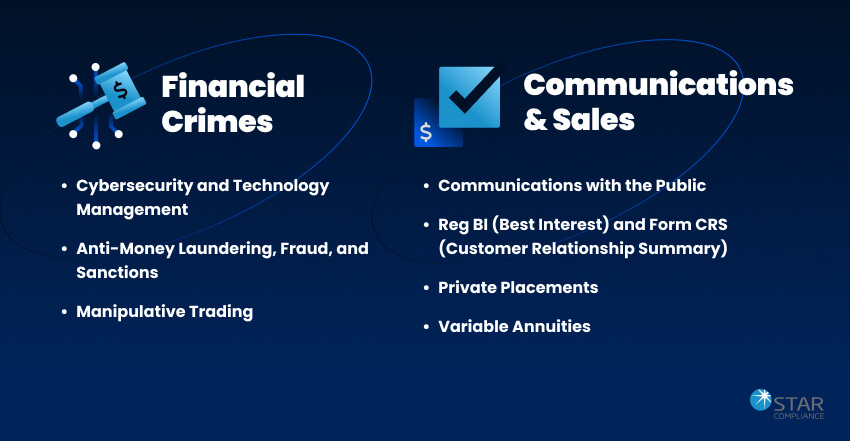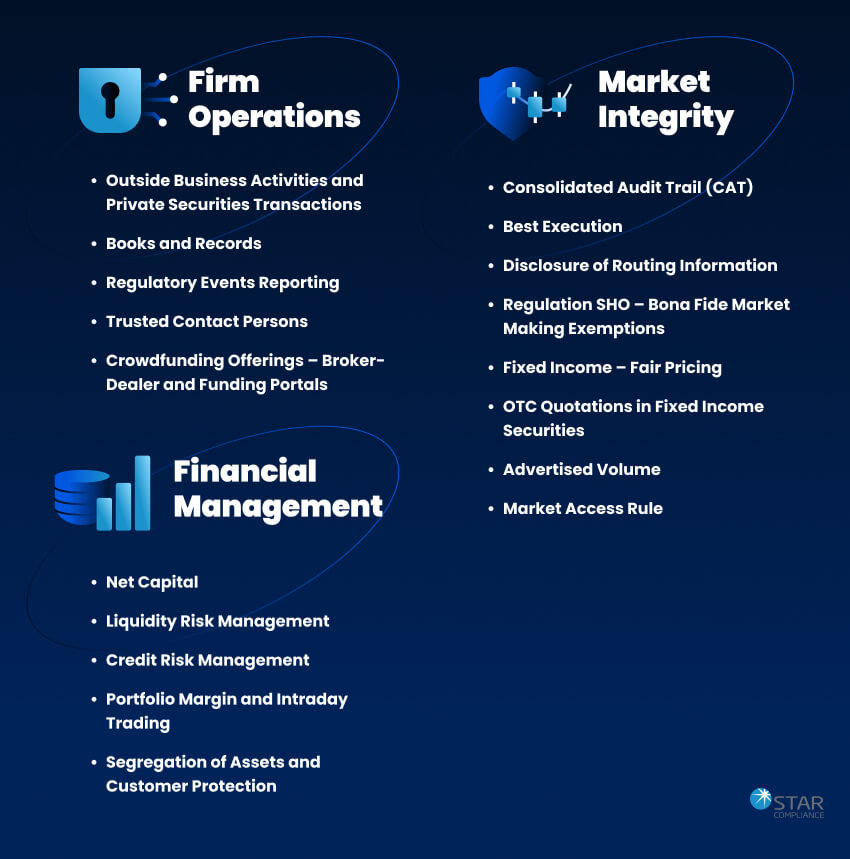How to Meet FINRA Compliance Requirements in 2025
Complying with all FINRA rules can be a challenge. Understanding the organization and its regulations can make it easier for firms to comply with confidence.
To meet FINRA compliance requirements, it’s important to know what FINRA is, what the organization oversees, and how firms are impacted if they don’t follow the FINRA’s guidelines and regulations. Having the proper compliance software in place can help monitor transactions and reduce time-consuming manual tasks that are prone to human error. But first, there are a few things firms can do to get on the right track.
What Is FINRA?
The Financial Industry Regulatory Authority (FINRA) is a United States non-governmental organization created to help regulate and protect the financial industry. FINRA is authorized by Congress and overseen by the Securities Exchange Commission (SEC).
FINRA has a multitude of responsibilities to keep financial markets fair and standards high, including:
- Monitoring and regulating stockbrokers
- Issuing licenses to brokers and firms
- Developing and helping to enforce SEC regulations
- Ensuring transparency in industry transactions
- Ensuring that financial data is kept secure
- Conducting compliance training and exams for members
- Investigating complaints and suspicious activity
FINRA monitors around 3,300 brokerage firms—processing up to 546 billion market events per day—and assesses all web content, printed materials, and communications to ensure clarity and transparency for investors.
FINRA Compliance Requirements
FINRA develops mandatory rules and regulations that apply to all brokers and brokerage firms, such as:
- Brokers must be licensed and registered.
- Brokers must have passed their examinations, have the right qualifications, and satisfy all continuing education requirements.
- Brokers must seek the most favorable terms reasonably available for a customer when executing securities transactions. This includes getting the best price for a trade while minimizing costs.
- Brokerage firms must use due diligence to learn and retain essential information about their customers, including investment objectives, risk tolerance, and financial status, in order to ensure they act in the customer’s best interest.
- Brokerage firms must establish and maintain an anti-money laundering compliance program designed to detect and report suspicious activities that could involve money laundering or other financial crimes.
- All communications with the public, including advertisements, social media posts, and other marketing materials, must be clear, fair, and accurate. Firms are also required to supervise communications to ensure compliance with regulations.
Professionally trained financial examiners monitor brokers and firms to ensure compliance with these rules. If any firms are found to be in violation of any FINRA or SEC regulations, they must undergo in-depth investigations and could face disciplinary action.
Penalties for FINRA noncompliance include:
- Substantial fines and restitution orders
- Formal censures
- Disgorgement of ill-gotten gains
- Suspensions or permanent dismissals and blacklisting
- Federal government investigations
- Cease-and-desist orders
- Expulsion from FINRA
These serious penalties help to deter misconduct and ensure integrity at all levels.
How To Ensure FINRA Compliance In 2025
FINRA compliance regulations are outlined every year in the FINRA’s Annual Regulatory Oversight Report (formerly the Report on Risk Monitoring and Examination Activities). This report summarizes noteworthy findings from recent examinations, outlines effective practices, and identifies considerations and resources for member firm compliance programs. These issues are grouped into six categories:
- Financial Crimes
- Crypto Asset Developments
- Firm Operations
- Communications and Sales
- Market Integrity
- Financial Management
Several new topics were added to the latest report, including regulations regarding cryptocurrency assets, artificial intelligence, off-channel communications, and market integrity. This is why it’s critical to remain up-to-date on FINRA and other industry regulations—as technology continues to develop at a rapid pace, new regulations are crucial to ensuring market integrity. Don’t get caught unprepared.


Understanding and staying up to date with FINRA’s extensive requirements can be a challenge, since they cover numerous areas and types of regulatory compliance. To ensure FINRA compliance in 2025, there are a few things your firm can do:
- Use a third-party compliance service: Partnering with third-party compliance experts can strengthen your firm’s programs, ensuring they meet evolving regulatory requirements. These external partners can conduct regular compliance audits, offer specialized training, and provide expert guidance on adherence to FINRA rules.
- Automate compliance processes: Upgrade your compliance software to an automated, data-driven system that leverages advanced analytics and real-time monitoring. Automation reduces human error, enhances efficiency, and allows firms to proactively identify potential compliance issues before they escalate.
- Evaluate whether to build or buy: Conduct a thorough analysis to determine whether building an in-house compliance tool, purchasing a third-party solution, or a hybrid of the two is more cost-effective and beneficial for your firm. Factor in your firm’s specific regulatory needs, resource availability, and the complexity of FINRA’s compliance requirements. An automated, scalable solution tailored to your business can ensure seamless adherence to regulations.
- Conduct regular compliance audits: Schedule periodic internal or external audits to review your firm’s compliance practices. This ensures that you can identify and address potential issues before they reach noncompliance.
- Implement a comprehensive training program: Continuous education is critical for staying compliant. Offer ongoing employee training on FINRA regulations and updates, including specialized training for compliance officers and supervisors.
- Establish a strong supervisory system: Implement clear supervisory procedures as required by FINRA Rule 3110. This includes appointing qualified supervisors, creating written supervisory procedures (WSPs), and regularly updating them to reflect regulatory changes or business practices.
- Use data analytics and monitoring tools: Leveraging advanced data analytics tools can help you identify trends, outliers, and red flags in transactions and communications. This proactive monitoring can prevent compliance breaches and help your firm respond more swiftly to emerging issues.
- Maintain a detailed record-keeping system: Ensure that all required records, including emails, transactions, communications, and customer information, are securely stored and easily retrievable. FINRA has strict record-keeping requirements (e.g., under FINRA Rule 4511) that firms must meet to demonstrate compliance.
- Adopt a robust cybersecurity framework: FINRA examinations are placing greater emphasis on cybersecurity. Adopt strong cybersecurity protocols to protect sensitive financial and customer data, minimizing the risk of data breaches that could lead to regulatory violations.
- Establish a whistleblower policy: Encourage employees to report potential compliance issues internally through a formal whistleblower policy. Clearly communicate that doing so can help catch violations early and address them before they become significant regulatory issues.
- Monitor regulatory updates and industry trends: Assign your compliance or legal team to stay informed of any updates or changes to FINRA regulations, including new guidance or rule amendments. Incorporating these changes into compliance practices in a timely manner can help avoid future violations.
- Develop a culture of compliance: Foster a workplace culture that prioritizes ethical behavior and compliance. This can be done through leadership support, clear communication of policies and values, and incentivizing employees to adhere to compliance policies.
- Utilize compliance dashboards and reporting systems: Dashboards and reporting tools can provide real-time visibility into compliance metrics, helping you track your firm’s status, monitor risks, and generate reports that are required for FINRA filings.
No matter the mode of execution, taking a comprehensive, future-ready approach to compliance will help to reduce errors and promote integrity among your teams. Consider implementing automated FINRA compliance tools to stay current and support your business’ continued success.
Frequently Asked Questions
Who needs to comply with FINRA regulations?
Any individual or firm engaging in the sale or trading of securities in the United States registered with FINRA must comply with its regulations. This includes stockbrokers, brokerage firms, financial advisors, and securities dealers.
What are the penalties for noncompliance with FINRA regulations?
Penalties for FINRA noncompliance include:
- Fines ranging from thousands to millions of dollars
- Suspensions or permanent bans from the securities industry
- Censures, which are formal reprimands
- Restitution orders to repay investors
- Expulsion of firms or individuals from FINRA
- Increased regulatory oversight or additional audits
- Cease-and-desist orders for specific practices
What is a FINRA audit, and how often does it happen?
A FINRA audit, also called an examination, is an inspection of a brokerage firm’s activities to ensure compliance with FINRA and SEC regulations. Audits are typically conducted every one to four years, depending on the firm’s risk profile and prior compliance history.
What are the continuing education requirements for brokers under FINRA?
FINRA mandates that registered brokers complete continuing education (CE) requirements to maintain their licenses. These include:
- Regulatory Element: A periodic, standardized training focused on regulatory and compliance updates
- Firm Element: Firm-specific training that addresses product knowledge, compliance issues, and sales practices
What is the FINRA CRD system?
The Central Registration Depository (CRD) is FINRA’s online system that firms use to register brokers and submit compliance forms. It houses records of qualifications, licensing, disciplinary actions, and employment history for financial professionals.
How do I file a complaint with FINRA?
Investors can file complaints against brokers or brokerage firms through FINRA’s online complaint center or by submitting a written complaint. FINRA investigates these complaints and may take disciplinary action if they uncover violations.



